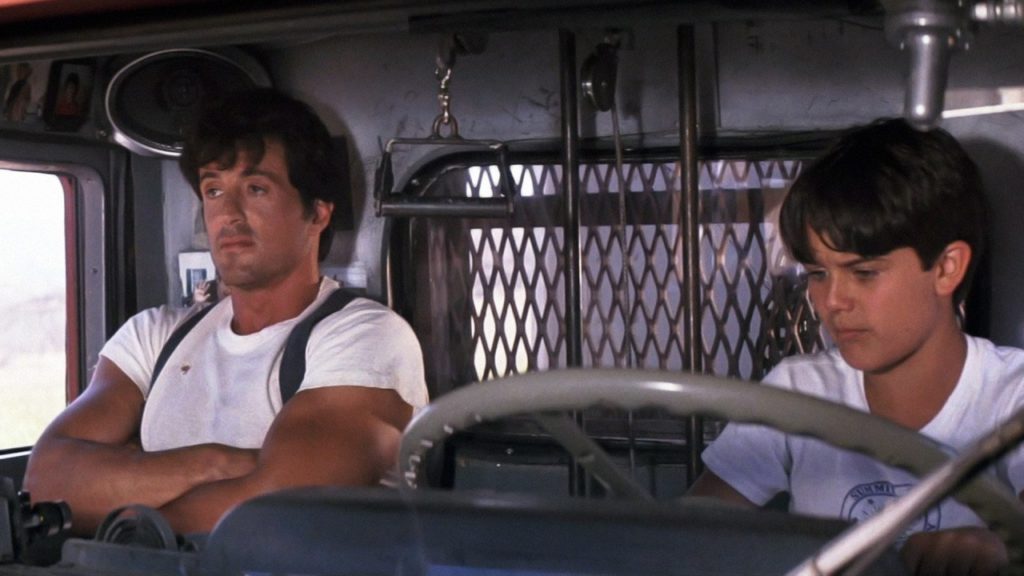
The production team of Golan-Globus came from Israel with the intent of reviving America’s art house cinema in the early eighties. Though they managed to produce a handful of artful pictures including Norman Mailer’s often misunderstood Tough Guys Don’t Dance (1987) and Jean-Luc Godard’s rarely seen King Lear (1987), Golan-Globus quickly became associated with the big budget exploitation action films that dominated the eighties film market. Menahem Golan himself directs Stallone in Over The Top (written by Stallone and Stirling Silliphant), a film about a trucker trying to re-connect with his estranged eleven-year-old son after the boy’s mother dies of cancer.
Before any analysis of Over The Top (1987) can take place, it seems important to answer the question “who is Sylvester Stallone?” Of course that question is not to be taken literally, the issue pertains to what he represents in American culture in the eighties. What is it that makes a performer a super star during a country’s most culturally bankrupt decade of filmmaking. To begin to answer that question, one must assess the two films that define the duality of Stallone’s celebrity persona. The first is Rocky. Rocky (1976) represents an escape from economic and social barriers, the overcoming of insurmountable odds in time for America’s bicentennial. The character Rocky is, to use a term coined by John Lennon, a “working class hero”. But Rocky is also an idiot, a big-hearted bruiser, whose underdog story proves that in America anyone can achieve anything. On the flipside of the Rocky persona is Rambo of First Blood (1982). Rambo embodies revenge for Vietnam and a political system that doesn’t always work. The “above the law” attitude of Rambo is applicable to a number of Stallone characters ranging from Cobra (1986) to Judge Dredd (1995). Each component of Stallone’s celebrity persona is catered to the post-Nixon America, the conservative backlash of the eighties.
The first act of Over The Top draws upon the thematic concerns of the Rocky films. Hawk arrives at his son’s military school graduation in his best duds, driving a freshly cleaned truck. Hawk is there at his ex-wife’s request. She has instructed that Hawk is to take their son home in his truck so that the two may bond during the three days ride in anticipation of her death. Hawk’s son Michael comes from the privileged world of his grandfather, a corporate kingpin, who looks down his nose at his father. However, Hawk is able to win his son over by simply being a nice, unassuming American everyman a boy wants as his father. Michael even comes to accept aspects of his father he found unforgivable (hustling arm wrestling truckers, sleeping in a truck, working out, etc). Workout montages ensue as father and son reconnect and years of separation are bridged with a driving lesson.
Father and son reach California to discover that Michael’s mother has died just hours before they arrived. Michael blames Hawk, and runs home to his grandfather (Robert Loggia). This is where the film abandons its ties to Stallone’s Rocky persona in favor of John Rambo. Hawk blames his father in law for his failed marriage and for taking Michael from him, while Michael’s grandfather spontaneously adopts the behavior and attitudes of a mafia Don. Enraged, Hawk drives his rig into Michael’s grandfather’s house, beating up bodyguards as he goes. Hawk is quickly overwhelmed and arrested. In jail, Michael visits Hawk and informs him that he doesn’t want him to stay. With that, Hawk agrees to stay out of state.
The third act of Over The Top is the most bizarre so far. Hawk enters into the International Arm Wrestling competition as an underdog in true Rocky fashion. But this segment of the film digresses from the familiar territory of Rocky and into a mocumentary. Between rounds of arm wrestling, contenders (including Hawk) talk to the camera about the competition as if they were being interviewed. The film stock and style of these sequences does little to indicate any departure from the narrative, thus they assume an uncomfortable ambiguity.
Elsewhere, Michael has embarked on an adventure that may have inspired Three Ninjas Knuckle Up (1995). He realizes his place is with his father and so he steals a car, sneaks onto a plane, and then takes a taxi to the Arm Wrestling match in Vegas. Michael’s escape prompts his grandfather to go to Vegas as well where he tries to buy off Hawk to no avail (Hawk returns to Rambo mode here).
As can be expected, Hawk and Michael are reunited in time for Hawk to win the last match and the competition. Together, father and son set out to start their own tucking company and fulfill their dreams, driving off to the sounds of a Giorgio Moroder soundtrack.
Over The Top is one of the most stylistically inconsistent and sentimental of films, yet it epitomizes all the appeal and contradictions of Stallone’s box-office persona. The film almost works as an analytical exercise of dual celebrity personas. Has there ever been a film whose structure showcased James Stewart’s western persona in one act and his lovable Mr. Hobbs Takes A Vacation persona in another, then combined the two in a third act? Alas, no. What’s strange is that Stallone’s dual personas are so closely linked to his image that they appear to be different sides of Hawk, though on a second viewing that argument doesn’t seem to apply.
Consider Hawk in act one. He is loving, dim witted, and hard working. His son is all he cares about, all he wants. In act two, he risks everything when he strikes out violently, he is careless, and he is vengeful. Yet because Stallone so often manifests either part in his films, the character issues of Hawk take on a kind of fluidity, a fluidity called celebrity.
